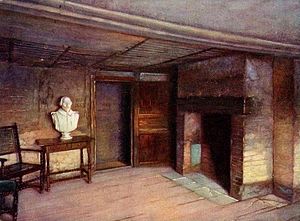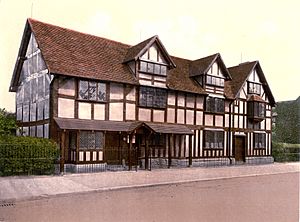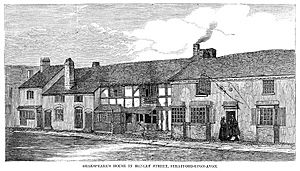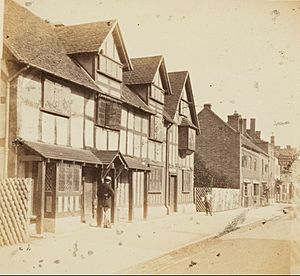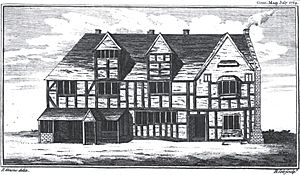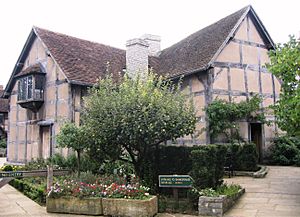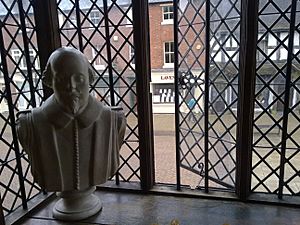Shakespeare's Birthplace facts for kids
Quick facts for kids Shakespeare's Birthplace |
|
|---|---|
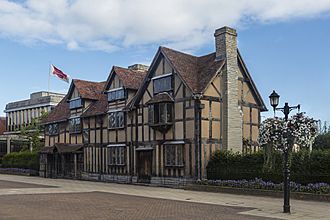
Shakespeare's Birthplace in 2012
|
|
| General information | |
| Type | House |
| Location | Henley Street, Stratford-upon-Avon, England |
| Coordinates | 52°11′38″N 1°42′29″W / 52.1939°N 1.7080°W |
| Completed | 16th-century |
| Owner | Shakespeare Birthplace Trust |
| Technical details | |
| Structural system | Half-timbered |
Shakespeare's Birthplace is an old house from the 1500s. It is in Stratford-upon-Avon, England. People believe that William Shakespeare, the famous writer, was born here in 1564. He also spent his childhood years in this house.
Today, the house is a small museum that anyone can visit. It is a very popular place for tourists. The Shakespeare Birthplace Trust owns and takes care of it. Many people call it "a special place for all who love literature."
Contents
About the House
The house itself looks quite simple. But in the late 1500s, it was a fairly large home. William's father, John Shakespeare, made gloves and traded wool. The house was split into two parts so he could run his business from there.
The building is not fancy in its design. It was built using a common method for the time. This method used a wooden frame filled with a mix called wattle and daub. This mix was made from woven sticks and mud. Local oak wood came from the Forest of Arden. Blue-grey stone from Wilmcote was also used. The large fireplaces were made from a mix of early brick and stone. The floors on the ground level were made of stone slabs.
The house was first built as a simple rectangle. On the ground floor, there was a living room with a fireplace. Next to it was a main hall with a large open fireplace. There was also a hallway and a room that was probably John Shakespeare's workshop. The upstairs had three rooms. You could reach them by stairs from the hall. People traditionally believe that the room above the living room is where Shakespeare was born. Later, a small house was added next to it. Also, a kitchen was built at the back with a room above it.
House History
People have different ideas about when the house was first built. Some think it dates back to the 1400s. But most believe it was built in the mid-1500s.
Records show that in 1552, John Shakespeare was fined for leaving a pile of dirt outside his home. This proves he lived on Henley Street at that time. It is believed that John Shakespeare was renting the house when William was born. Ten years later, he was able to buy two houses on Henley Street. The house stayed in the Shakespeare family for many years. Since William was born in 1564, it is very likely he grew up there.
Who Owned the House?
After John Shakespeare died, William inherited the house. But William already owned a bigger house called New Place in Stratford. So, he did not need the Henley Street house for himself. The main part of the house was rented out and became an inn. It was first called the Maidenhead. Later, it was known as the Swan and Maidenhead Inn.
The smaller part of the house was used as a home. By the time Shakespeare died in 1616, his sister, Joan Hart, lived there. She had recently become a widow.
According to Shakespeare's will, his older daughter, Susanna, inherited the whole property. This included the inn and Joan Hart's cottage. After Susanna, her only child, Elizabeth, owned it. Then, in 1670, it went to Thomas Hart. He was a descendant of Shakespeare's sister, Joan. Her family had continued to rent the smaller house. The Hart family owned the entire property until 1806. Then, they sold it to a butcher named Thomas Court. He also took over running the inn.
Saving the Birthplace
After the Shakespeare family line ended, the house started to fall apart. But in the 1700s, people became interested in it again. Famous visitors like Isaac Watts, Charles Dickens, Sir Walter Scott, and Thomas Carlyle came to see it. They even signed their names on the walls and windows. Many signatures are still on the windowpanes today. However, the signed walls have been painted over. A guest book also has signatures from Lord Byron, Alfred, Lord Tennyson, John Keats, and William Thackeray.
Interest in the house grew even more when it was put up for sale in 1846. This happened after the death of Thomas Court's widow. An American showman named P. T. Barnum wanted to buy the house. He planned to move it "brick-by-brick" to the United States. To stop this, a group called the Shakespeare Birthday Committee was formed. This group later became the Shakespeare Birthplace Trust. With help from people like Charles Dickens, the Committee raised £3,000. They bought the house the next year, saving it.
Fixing Up the House
Once the Committee (now the Trust) owned the building, they started fixing it up. The Birthplace was originally part of a row of houses. Other houses were built next to it later. The first step was to remove these newer houses. This was done to prevent any fire from spreading to the Birthplace.
Old photos show that in the early 1800s, part of the front of the Birthplace was covered with brick. This was a cheaper way to update old timber-framed buildings. The Trust used an old picture from 1769 and clues from the building itself. Between 1857 and 1864, they rebuilt the outside of the house. They made it look like it did in the 1500s.
Today at the Birthplace
Next to the Birthplace is the Shakespeare Centre. This is a modern building made of glass and concrete. It is the main office for the Shakespeare Birthplace Trust. Dr. Levi Fox led the building of this center. It opened in 1964. Its purpose was to properly store the Trust's library, documents, and collections. The Shakespeare Centre also has displays about Shakespeare. It is the public entrance to the Birthplace house.
Inside the Birthplace, you can see what family life was like in Shakespeare's time. The house has furniture from that period. There is also a glass window with signatures of visitors from hundreds of years ago. You can also see John Shakespeare's glove-making workshop.
The garden behind the house has a wall around it. It is planted with flowers and herbs. These are the kinds of plants that would have been grown in Shakespeare's time.
 | Jewel Prestage |
 | Ella Baker |
 | Fannie Lou Hamer |


